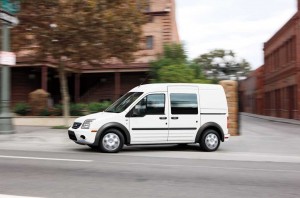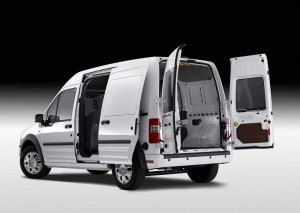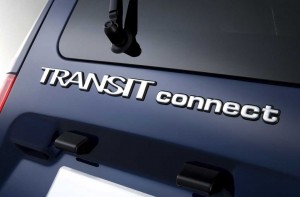
Ford's urban Transit Connect van
Ford Motor Co. will charge into the Chicago Auto Show, this week, with the production version of its new Transit Connect commercial van. That includes a battery-powered version set to debut in 2010.
Based on a popular, downsized van now sold in Europe, Ford is betting it can expand its appeal to the urban business market with Transit Connect, which will go on sale in the U.S., mid-year. Equipped with a 2.0-liter inline-four-cylinder engine, which Ford expects to get “at least” 20 mpg City, 24 Highway, a base model will go for $21,475. No price has yet been set on the EV version.
If the five different models rolling onto the floor at Chicago’s McCormick Place are any indication, however, buyers will be picking and choosing from an extensive array of options, including interior shelving, rear doors and more.
“You may think we’re getting carried away with customization,” says Derrick Kuzak, head of global product development, at Ford, “but that’s exactly the point – to be able to match the needs of a business or fleet owner.”

Ford plans to offer significant customization
Transit Connect is the first in what is expected to be a series of European vehicles migrating to the U.S. market. Ford is betting there’ll be particularly strong demand in crowded cities, such as Chicago or Los Angeles, which have an increasing amount in common with the dense urban communities of Europe. Despite its relatively small footprint, Transit Connect can carry a significant payload – at up to 1600 pounds, it can haul more than a base Dodge Ram pickup, Kuzak noted.
The inter-city market could prove particularly receptive to an electric truck, Ford is betting – for one thing, because energy costs would be a fraction of what a business would pay for gasoline, especially if petroleum rebounds when the economy recovers.
Ford officials won’t provide many details about the EV version of Transit Connect, except to say that British-based Smith Electric Vehicles will do the conversion, using “gliders,” vehicles provided by the factory without an engine. Where the conversion will be done is unclear, but that’s likely to take place in the U.K., according to sources.
One concern, analysts raise, about Transit Connect, is Ford’s decision to produce the van in Turkey, at least initially. With the current exchange rate penalizing European imports, that’s a reasonable alternative, but some observers fear that it will still make it difficult to earn a profit on the van, whether it is gas or electric-powered.
 The electric van will launch during the second half of 2010, and be followed by three other new battery-powered vehicles, Kuzak confirmed, a Focus sedan-sized EV in 2011, and both a new plug-in and conventional hybrid in 2012.
The electric van will launch during the second half of 2010, and be followed by three other new battery-powered vehicles, Kuzak confirmed, a Focus sedan-sized EV in 2011, and both a new plug-in and conventional hybrid in 2012.

This is good news. This is exactly the type of product that “American” automakers should be coming up with. Too bad they aren’t making it in the U.S. Ford has made some really dumb decisions fairly recently in this segment of the market. Like not replacing their ancient E series vans with their modern European one to compete against the far superior Daimler/Chrysler/Freightliner Sprinter vans (now on the 2nd generation in the U.S.). I remember reading at the time that they decided not to make this no brainer decision because they had huge market share in the van segment already and didn’t want to mess with that. Every time I see a Sprinter go by, I hope they fired whatever sub-geniuses made that bone headed call.
It IS intriguing to watch Ford base a significant portion of its future on its European operations.
Paul A. Eisenstein
Bureau Chief, TheDetroitBureau.com